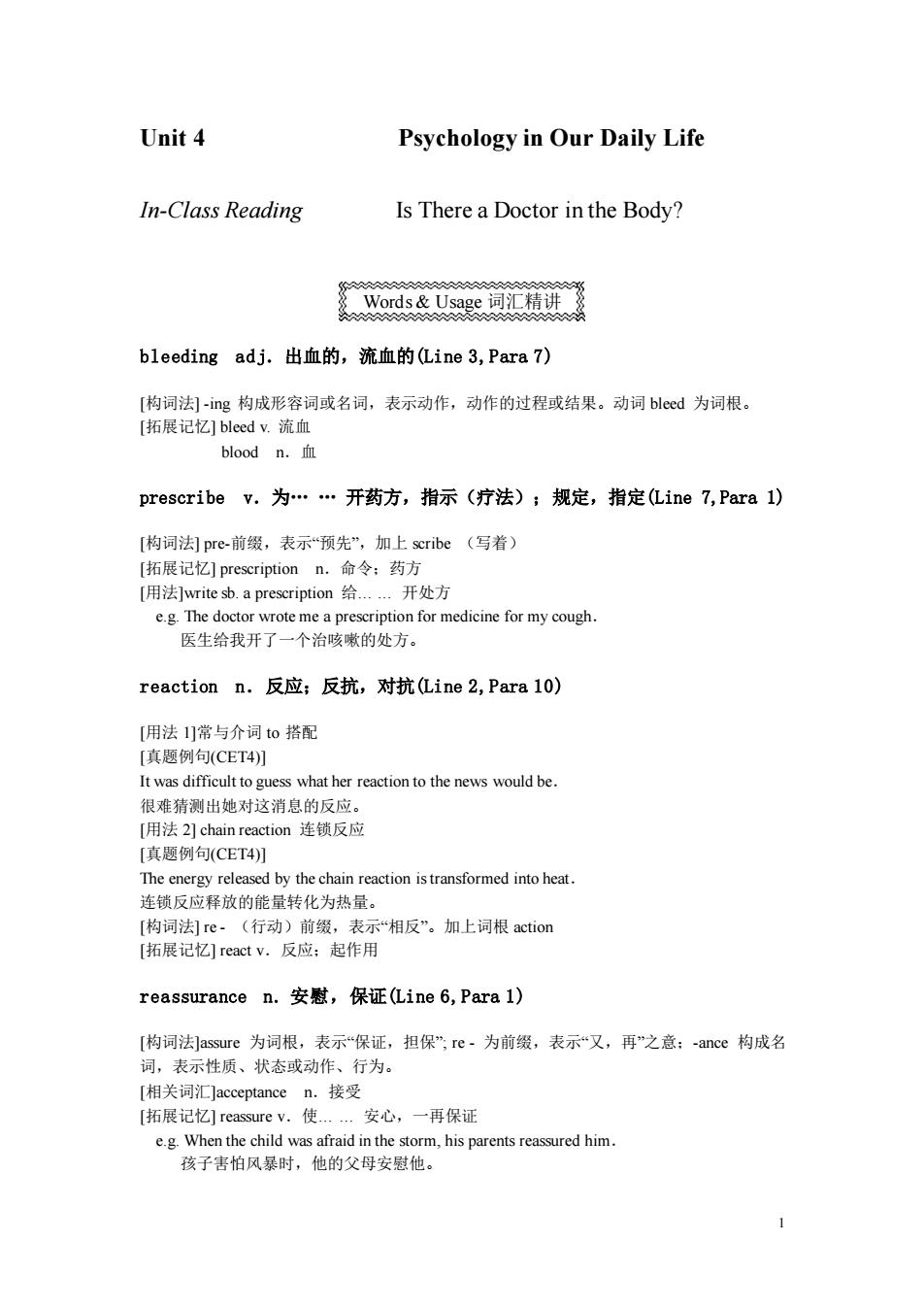
Unit 4 Psychology in Our Daily Life In-Class Reading Is There a Doctor in the Body? Words&Usage词汇精讲 bleeding adj.出血的,流血的(Line3,Para7) [构词法]-ing构成形容词或名词,表示动作,动作的过程或结果。动词bleed为词根。 [拓展记忆]bleed v.流血 blood n.血 prescribe v.为…·开药方,指示(疗法);规定,指定(Line7,Para 1) [构词法]pre-前缀,表示预先”,加上scribe(写着) [拓展记忆]prescription n.命令:药方 [用法]write sb.a prescription给...开处方 e.g.The doctor wrote me a prescription for medicine for my cough. 医生给我开了一个治咳嗽的处方。 reaction n.反应;反抗,对抗(Line2,Para 10) [用法1]常与介词to搭配 [真题例句(CET4) It was difficult to guess what her reaction to the news would be. 很难猜测出她对这消息的反应。 [用法2]chain reaction连锁反应 [真题例句(CET4)] The energy released by the chain reaction is transformed into heat. 连锁反应释放的能量转化为热量。 [构词法]re-(行动)前缀,表示“相反”。加上词根action [拓展记忆]react v.反应:起作用 reassurance n.安慰,保证(Line6,Para1) [构词法]assure为词根,表示“保证,担保”,re-为前缀,表示“又,再”之意:-ance构成名 词,表示性质、状态或动作、行为。 [相关词汇]acceptance n.接受 [拓展记忆]reassure v.使..安心,一再保证 e.g.When the child was afraid in the storm,his parents reassured him. 孩子害怕风暴时,他的父母安慰他。 1
1 Unit 4 Psychology in Our Daily Life In-Class Reading Is There a Doctor in the Body? Words & Usage 词汇精讲 bleeding adj.出血的,流血的(Line 3,Para 7) [构词法] -ing 构成形容词或名词,表示动作,动作的过程或结果。动词 bleed 为词根。 [拓展记忆] bleed v. 流血 blood n.血 prescribe v.为… … 开药方,指示(疗法);规定,指定(Line 7,Para 1) [构词法] pre-前缀,表示“预先”,加上 scribe (写着) [拓展记忆] prescription n.命令;药方 [用法]write sb. a prescription 给… … 开处方 e.g. The doctor wrote me a prescription for medicine for my cough. 医生给我开了一个治咳嗽的处方。 reaction n.反应;反抗,对抗(Line 2,Para 10) [用法 1]常与介词 to 搭配 [真题例句(CET4)] It was difficult to guess what her reaction to the news would be. 很难猜测出她对这消息的反应。 [用法 2] chain reaction 连锁反应 [真题例句(CET4)] The energy released by the chain reaction istransformed into heat. 连锁反应释放的能量转化为热量。 [构词法] re - (行动)前缀,表示“相反”。加上词根 action [拓展记忆] react v.反应;起作用 reassurance n. 安慰,保证(Line 6,Para 1) [构词法]assure 为词根,表示“保证,担保”; re - 为前缀,表示“又,再”之意;-ance 构成名 词,表示性质、状态或动作、行为。 [相关词汇]acceptance n.接受 [拓展记忆] reassure v.使… … 安心,一再保证 e.g. When the child was afraid in the storm, his parents reassured him. 孩子害怕风暴时,他的父母安慰他

swear v.发誓(Line6,Para10) [用法1]swear at诅咒 e.g.He was so angry that he swore at his boss. 他气愤地骂了他的老板。 [用法2]swear by信赖:确定:以....起誓 e.g.I think she said she was going to the library,but I couldn't swear by it. 我想她说过要去图书馆,但我不肯定。 treatment n.治疗;处理,对待(Line8,Para 11) [真题例句(CET4)] She was complaining that the doctor was charging too much for the treatment he was giving her. 她抱怨医生收费过高。 [构词法]-ment名词后缀,表示行动,过程。 [拓展记忆]treat v.治疗,对待 知fct Sentences难包详劂 1. Sometimes all a sick person needs is some reassurance that all will be well.(Line 5,Para.1) 译文有时病人所需要的只是一个一切都会好的保证。 Explanation: I)AIl+sb.needs/cares about/remembers...is+表语,表示“某人所需要的/关心的/记着的 一切就是...”。句子中all a sick person needs的主语是all,相当于the only thing。a sick person needs是省略了关系代词that的定语从句,修饰al这个主语。all为代词,单独使 用时,视为单数。 e.g.All he needs now is encouragement. All I remember about my childhood is the beautiful river in which I used to swim 2)all,everything,.anything nobody,anybody等不定代词作先行词时,定语从句关系词不 能用which可以用that或者省略that。 3)that all will be well是reassurance的同位语从句,与reassurance起同样作用,表达同 一概念.同位语从句的引导词that不能省略.除了“reassurance'”,其它fact,opinion,notion, suggestion,proposal,,thought,.news,truth,report等词的后面也可接同位语从句。 e.g.There was a suggestion that Brown should be dropped from the team. I won't believe the fact that he lied to his mother. The news that Tom would go abroad is told by him 2.It is as if there was a doctor in each of us.The "doctor"will heal the body for us if we let it. (Line 3.Para.3) 译文 就好像我们每个人体内都有一个医生一样,这位“医生能治好我们的病,如果我们让他治疗
2 swear v.发誓(Line 6,Para 10) [用法 1] swear at 诅咒 e.g. He was so angry that he swore at his boss. 他气愤地骂了他的老板。 [用法 2] swear by 信赖;确定;以… … 起誓 e.g. I think she said she was going to the library, but I couldn’t swear by it. 我想她说过要去图书馆,但我不肯定。 treatment n.治疗;处理,对待(Line 8,Para 11) [真题例句(CET4)] She was complaining that the doctor was charging too much for the treatment he was giving her. 她抱怨医生收费过高。 [构词法]-ment 名词后缀,表示行动,过程。 [拓展记忆]treat v.治疗,对待 Difficult Sentences 难句详解 1. Sometimes all a sick person needs is some reassurance that all will be well. (Line 5, Para. 1) 译文: 有时病人所需要的只是一个一切都会好的保证。 Explanation: 1)All + sb. needs/cares about/remembers… is + 表语,表示“某人所需要的/关心的/记着的 一切就是……”。句子中 all a sick person needs 的主语是 all, 相当于 the only thing。a sick person needs 是省略了关系代词 that 的定语从句,修饰 all 这个主语。all 为代词,单独使 用时,视为单数。 e.g. All he needs now is encouragement. All I remember about my childhood is the beautiful river in which I used to swim. 2)all, everything, anything, nobody, anybody 等不定代词作先行词时,定语从句关系词不 能用 which 可以用 that 或者省略 that。 3)that all will be well 是 reassurance 的同位语从句,与 reassurance 起同样作用,表达同 一概念。同位语从句的引导词 that 不能省略。除了 “reassurance”, 其它fact, opinion, notion, suggestion, proposal, thought, news, truth, report 等词的后面也可接同位语从句。 e.g. There was a suggestion that Brown should be dropped from the team. I won’t believe the fact that he lied to his mother. The news that Tom would go abroad is told by him. 2. It is as if there was a doctor in each of us. The “doctor” will heal the body for us if we let it. (Line 3, Para. 3) 译文: 就好像我们每个人体内都有一个医生一样,这位“医生”能治好我们的病,如果我们让他治疗
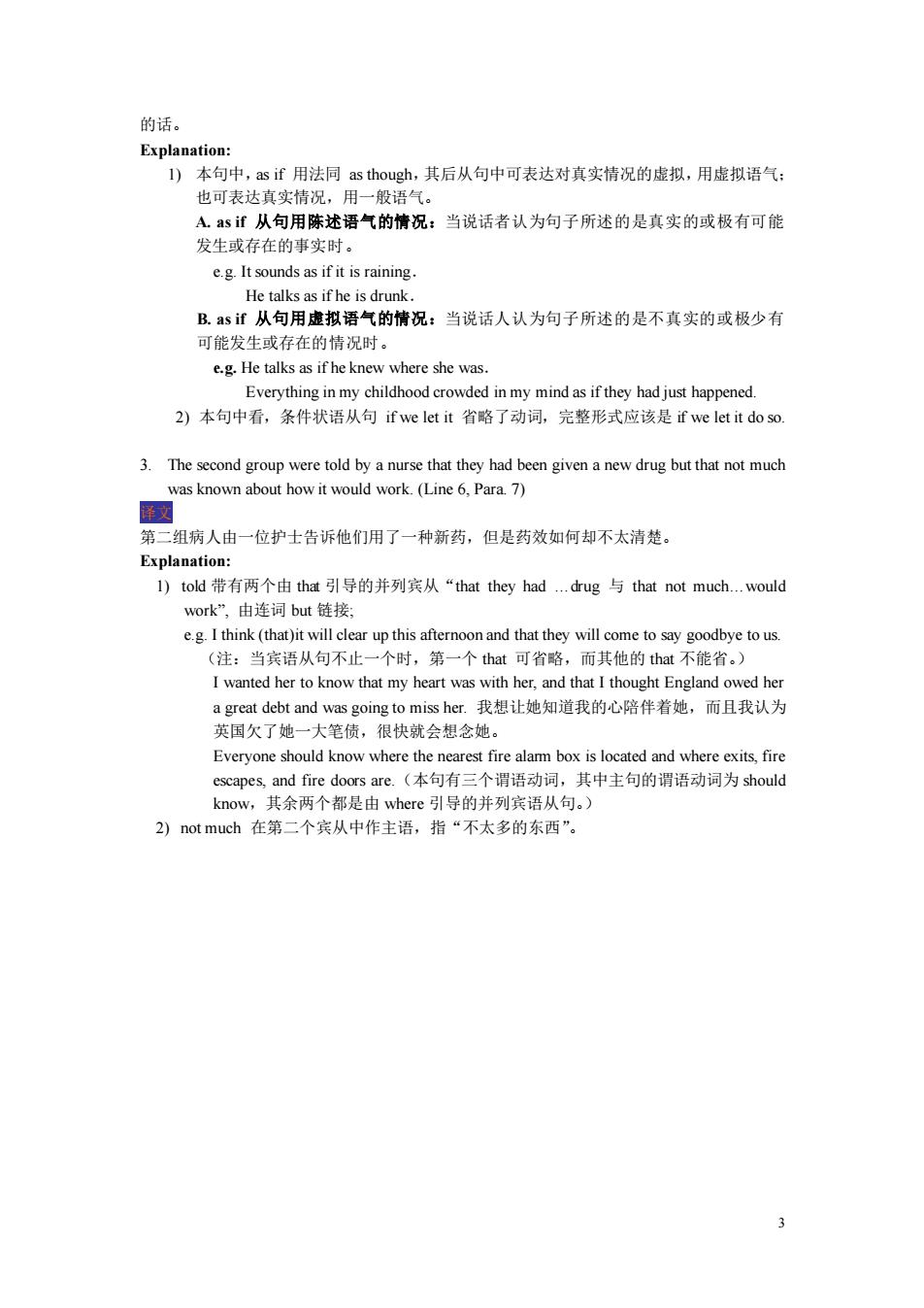
的话。 Explanation: I)本句中,asif用法同as though,其后从句中可表达对真实情况的虚拟,用虚拟语气: 也可表达真实情况,用一般语气。 A.asif从句用陈述语气的情况:当说话者认为句子所述的是真实的或极有可能 发生或存在的事实时。 e.g.It sounds as if it is raining. He talks as if he is drunk. B.asf从句用虚拟语气的情况:当说话人认为句子所述的是不真实的或极少有 可能发生或存在的情况时。 e.g.He talks as if he knew where she was. Everything in my childhood crowded in my mind as if they had just happened. 2)本句中看,条件状语从句if we let it省略了动词,完整形式应该是if we let it do so. 3.The second group were told by a nurse that they had been given a new drug but that not much was known about how it would work.(Line 6,Para.7) 译双 第二组病人由一位护士告诉他们用了一种新药,但是药效如何却不太清楚。 Explanation: l)told带有两个由that引导的并列宾从“that they had…trug与that not much...would work”,由连词but链接; e.g.I think (that)it will clear up this afternoon and that they will come to say goodbye to us. (注:当宾语从句不止一个时,第一个hat可省略,而其他的that不能省。) I wanted her to know that my heart was with her,and that I thought England owed her a great debt and was going to miss her.我想让她知道我的心陪伴着她,而且我认为 英国欠了她一大笔债,很快就会想念她。 Everyone should know where the nearest fire alarm box is located and where exits,fire escapes,.and fire doors are..(本句有三个谓语动词,其中主句的谓语动词为should know,其余两个都是由where引导的并列宾语从句。) 2)not much在第二个宾从中作主语,指“不太多的东西”。 3
3 的话。 Explanation: 1) 本句中,as if 用法同 as though,其后从句中可表达对真实情况的虚拟,用虚拟语气; 也可表达真实情况,用一般语气。 A. as if 从句用陈述语气的情况:当说话者认为句子所述的是真实的或极有可能 发生或存在的事实时。 e.g. It sounds as if it is raining. He talks as if he is drunk. B. as if 从句用虚拟语气的情况:当说话人认为句子所述的是不真实的或极少有 可能发生或存在的情况时。 e.g. He talks as if he knew where she was. Everything in my childhood crowded in my mind as if they had just happened. 2) 本句中看,条件状语从句 if we let it 省略了动词,完整形式应该是 if we let it do so. 3. The second group were told by a nurse that they had been given a new drug but that not much was known about how it would work. (Line 6, Para. 7) 译文 第二组病人由一位护士告诉他们用了一种新药,但是药效如何却不太清楚。 Explanation: 1) told 带有两个由 that 引导的并列宾从“that they had …drug 与 that not much…would work”, 由连词 but 链接; e.g. I think (that)it will clear up this afternoon and that they will come to say goodbye to us. (注:当宾语从句不止一个时,第一个 that 可省略,而其他的 that 不能省。) I wanted her to know that my heart was with her, and that I thought England owed her a great debt and was going to miss her. 我想让她知道我的心陪伴着她,而且我认为 英国欠了她一大笔债,很快就会想念她。 Everyone should know where the nearest fire alarm box is located and where exits, fire escapes, and fire doors are.(本句有三个谓语动词,其中主句的谓语动词为 should know,其余两个都是由 where 引导的并列宾语从句。) 2) not much 在第二个宾从中作主语,指“不太多的东西
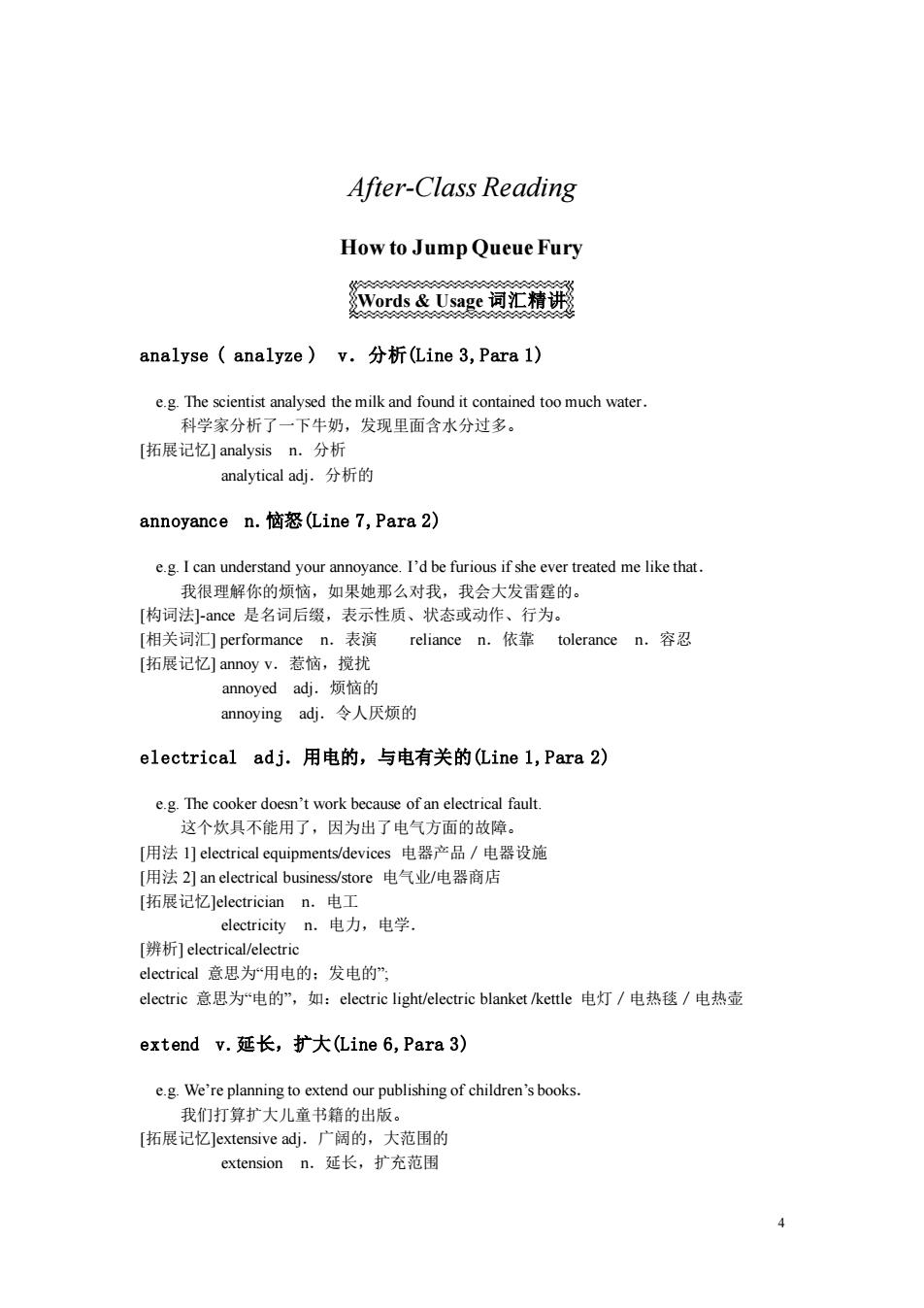
After-Class Reading How to Jump Queue Fury or也&:词江精进 analyse(analyze)v.分析(Line3,Para1) e.g.The scientist analysed the milk and found it contained too much water. 科学家分析了一下牛奶,发现里面含水分过多。 [拓展记忆]analysis n.分析 analytical adj..分析的 annoyance n.恼怒(Line7,Para2) e.g.I can understand your annoyance.I'd be furious if she ever treated me like that. 我很理解你的烦恼,如果她那么对我,我会大发雷霆的。 [构词法]-ance是名词后缀,表示性质、状态或动作、行为。 [相关词汇)]performance n.表演 reliance n.依靠tolerance n.容忍 [拓展记忆]annoy v.惹恼,搅扰 annoyed adj.烦恼的 annoying adj.令人厌烦的 electrical adj.用电的,与电有关的(Line1,Para2) e.g.The cooker doesn't work because of an electrical fault. 这个炊具不能用了,因为出了电气方面的故障。 [用法l]electrical equipments/devices电器产品/电器设施 [用法2]an electrical business/store电气业/电器商店 [拓展记忆]electrician n.电工 electricity n.电力,电学. [辨析]electrical/electric electrical意思为用电的:发电的, electric意思为“电的”,如:electric light/electric blanket/kettle电灯/电热毯/电热壶 extend v.延长,扩大(Line6,Para3) e.g.We're planning to extend our publishing of children's books. 我们打算扩大儿童书籍的出版。 [拓展记忆]extensive adj..广阔的,大范围的 extension n.延长,扩充范围
4 After-Class Reading How to Jump Queue Fury Words & Usage 词汇精讲 analyse ( analyze ) v.分析(Line 3,Para 1) e.g. The scientist analysed the milk and found it contained too much water. 科学家分析了一下牛奶,发现里面含水分过多。 [拓展记忆] analysis n.分析 analytical adj.分析的 annoyance n.恼怒(Line 7,Para 2) e.g. I can understand your annoyance. I’d be furious if she ever treated me like that. 我很理解你的烦恼,如果她那么对我,我会大发雷霆的。 [构词法]-ance 是名词后缀,表示性质、状态或动作、行为。 [相关词汇] performance n.表演 reliance n.依靠 tolerance n.容忍 [拓展记忆] annoy v.惹恼,搅扰 annoyed adj.烦恼的 annoying adj.令人厌烦的 electrical adj.用电的,与电有关的(Line 1,Para 2) e.g. The cooker doesn’t work because of an electrical fault. 这个炊具不能用了,因为出了电气方面的故障。 [用法 1] electrical equipments/devices 电器产品/电器设施 [用法 2] an electrical business/store 电气业/电器商店 [拓展记忆]electrician n.电工 electricity n.电力,电学. [辨析] electrical/electric electrical 意思为“用电的;发电的”; electric 意思为“电的”,如:electric light/electric blanket /kettle 电灯/电热毯/电热壶 extend v.延长,扩大(Line 6,Para 3) e.g. We’re planning to extend our publishing of children’s books. 我们打算扩大儿童书籍的出版。 [拓展记忆]extensive adj.广阔的,大范围的 extension n.延长,扩充范围

lengthen v.加长,变长(Line1,Para3) e.g.I decide to lengthen the skirt. 我准备把这条裙子加长。 [构词法]-en与名词构成动词,表示“使有、具有”。 [反义词链接]shorten [拓展记忆]length n.长度 lengthy adj.冗长的 minimize v.使……减少到最低限度;轻视(亿ine3,Para6) e.g.One of the effective measures to minimize the dangers of driving is to teach people to obey all the rules of the road. 将驾驶过程中的危险降低到最小程度的有效措施之一就是教育人们遵守一切交通规 则。 [反义词链接]maximize [拓展记忆]minimum adj.最小的,最低的n.最小值,最小化 preferable adj.更好的;更合意的(注:preferable没有比较级)(Line 5,Para 4) [用法1]A is preferable to B A比B更好 e.g.Coffee is preferable to tea,I think.我认为咖啡比茶更好。 [构词法]-able构成形容词后缀,表示“能.…的”。 [拓展记忆]prefer v.更喜爱 preference n.偏爱 「transfer,./n·转移,转换 unbearable adj.无法忍受的(Line4,Para4) e.g.It was a beautiful country,but I found the heat unbearable. 那是个美丽的国家,但那炎热令人难受。 [构词法]un-表示否定。 -able,形容词后缀,表示“能..的”。 [近义词链接]intolerable [反义词链接bearable,tolerable [拓展记忆bear v.忍受 bearable adj.可以忍受的 [真题例句(CET4)] The discipline at the military academy is so rigid that students can hardly bear it. 军事院校的纪律非常严格,学生难以忍受。 5
5 lengthen v. 加长,变长(Line 1,Para 3) e.g. I decide to lengthen the skirt. 我准备把这条裙子加长。 [构词法]-en 与名词构成动词,表示“使有、具有”。 [反义词链接]shorten [拓展记忆] length n.长度 lengthy adj.冗长的 minimize v.使… … 减少到最低限度;轻视(Line 3,Para 6) e.g. One of the effective measures to minimize the dangers of driving is to teach people to obey all the rules of the road. 将驾驶过程中的危险降低到最小程度的有效措施之一就是教育人们遵守一切交通规 则。 [反义词链接]maximize [拓展记忆]minimum adj.最小的,最低的 n.最小值,最小化 preferable adj.更好的;更合意的 (注:preferable 没有比较级)(Line 5,Para 4) [用法 1] Ais preferable to B A 比 B 更好 e.g. Coffee is preferable to tea, I think.我认为咖啡比茶更好。 [构词法]-able 构成形容词后缀,表示“能… … 的”。 [拓展记忆] prefer v.更喜爱 preference n.偏爱 「transfer , . / n .转移,转换 unbearable adj.无法忍受的(Line 4,Para 4) e.g. It was a beautiful country , but I found the heat unbearable. 那是个美丽的国家,但那炎热令人难受。 [构词法] un- 表示否定。 -able ,形容词后缀,表示“能… … 的”。 [近义词链接]intolerable [反义词链接]bearable , tolerable [拓展记忆]bear v.忍受 bearable adj.可以忍受的 [真题例句(CET4)] The discipline at the military academy is so rigid that students can hardly bear it. 军事院校的纪律非常严格,学生难以忍受
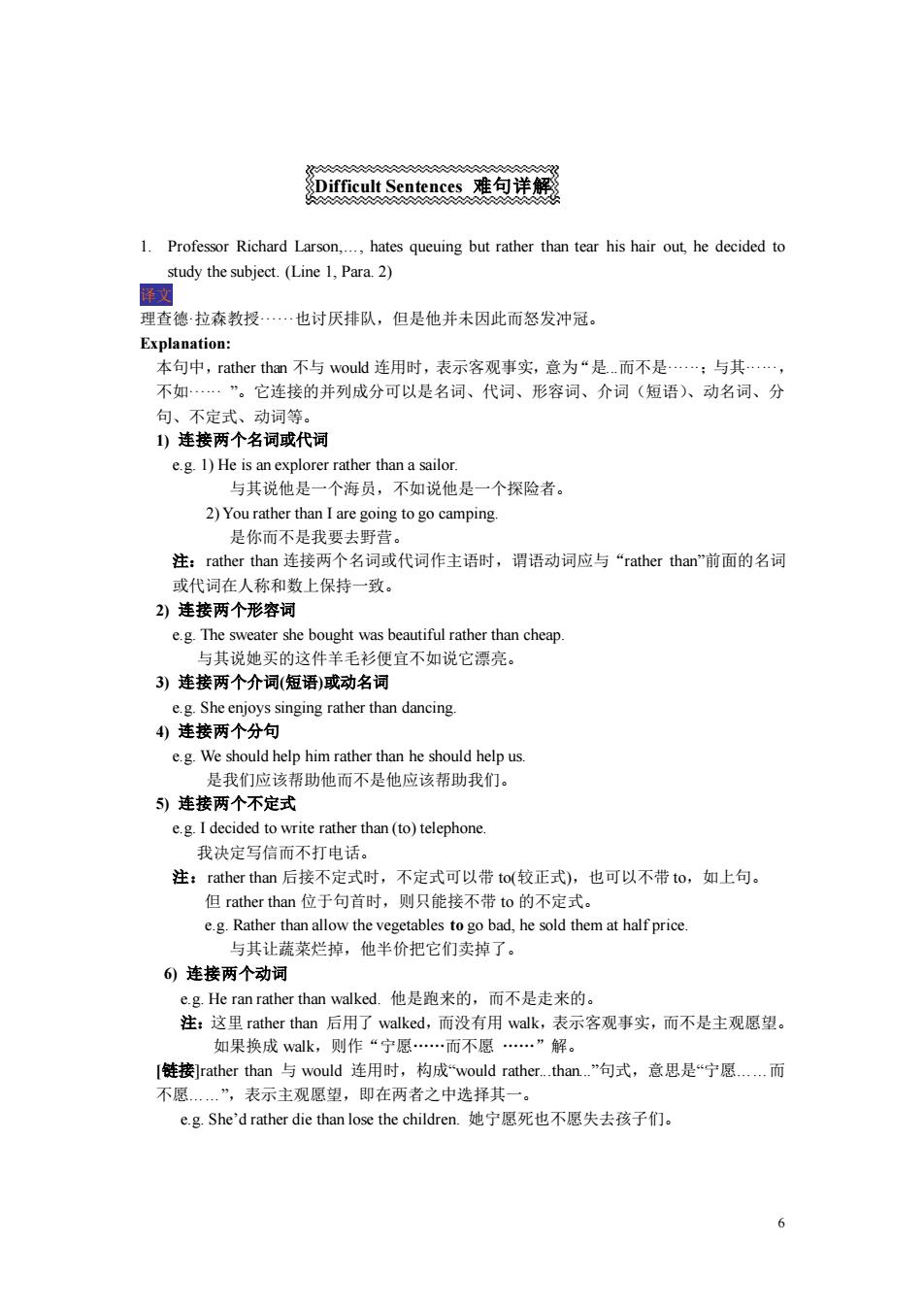
RAAAAAAAAAAAAAAAAAAAAAR 知难句详解 1.Professor Richard Larson,...,hates queuing but rather than tear his hair out,he decided to study the subject.(Line 1.Para.2) 译文 理查德·拉森教授·也讨厌排队,但是他并未因此而怒发冲冠。 Explanation: 本句中,rather than不与would连用时,表示客观事实,意为“是.而不是…:与其…, 不如…”。它连接的并列成分可以是名词、代词、形容词、介词(短语)、动名词、分 句、不定式、动词等。 1)连接两个名词或代词 e.g.1)He is an explorer rather than a sailor. 与其说他是一个海员,不如说他是一个探险者。 2)You rather than I are going to go camping 是你而不是我要去野营。 注:rather than连接两个名词或代词作主语时,谓语动词应与“rather than'”前面的名词 或代词在人称和数上保持一致。 2)连接两个形容词 e.g.The sweater she bought was beautiful rather than cheap. 与其说她买的这件羊毛衫便宜不如说它漂亮。 3)连接两个介词(短语)或动名词 e.g.She enjoys singing rather than dancing. 4)连接两个分句 e.g.We should help him rather than he should help us. 是我们应该帮助他而不是他应该帮助我们。 5)连接两个不定式 e.g.I decided to write rather than (to)telephone 我决定写信而不打电话。 注:rather than后接不定式时,不定式可以带to(较正式),也可以不带to,如上句。 但rather than位于句首时,则只能接不带to的不定式。 e.g.Rather than allow the vegetables to go bad,he sold them at half price. 与其让蔬菜烂掉,他半价把它们卖掉了。 6)连接两个动词 e.g.He ran rather than walked.他是跑来的,而不是走来的: 注:这里rather than后用了waIked,而没有用walk,表示客观事实,而不是主观愿望。 如果换成walk,则作“宁愿…而不愿…”解。 [链接]rather than与would连用时,构成“would rather..than.句式,意思是“宁愿...而 不愿...”,表示主观愿望,即在两者之中选择其一。 e.g.She'd rather die than lose the children.她宁愿死也不愿失去孩子们。 6
6 Difficult Sentences 难句详解 1. Professor Richard Larson,…, hates queuing but rather than tear his hair out, he decided to study the subject. (Line 1, Para. 2) 译文 理查德·拉森教授······也讨厌排队,但是他并未因此而怒发冲冠。 Explanation: 本句中,rather than 不与 would 连用时,表示客观事实,意为“是...而不是······;与其······, 不如······ ”。它连接的并列成分可以是名词、代词、形容词、介词(短语)、动名词、分 句、不定式、动词等。 1) 连接两个名词或代词 e.g. 1) He is an explorer rather than a sailor. 与其说他是一个海员,不如说他是一个探险者。 2) You rather than I are going to go camping. 是你而不是我要去野营。 注:rather than 连接两个名词或代词作主语时,谓语动词应与“rather than”前面的名词 或代词在人称和数上保持一致。 2) 连接两个形容词 e.g. The sweater she bought was beautiful rather than cheap. 与其说她买的这件羊毛衫便宜不如说它漂亮。 3) 连接两个介词(短语)或动名词 e.g. She enjoys singing rather than dancing. 4) 连接两个分句 e.g. We should help him rather than he should help us. 是我们应该帮助他而不是他应该帮助我们。 5) 连接两个不定式 e.g. I decided to write rather than (to) telephone. 我决定写信而不打电话。 注:rather than 后接不定式时,不定式可以带 to(较正式),也可以不带 to,如上句。 但 rather than 位于句首时,则只能接不带 to 的不定式。 e.g. Rather than allow the vegetables to go bad, he sold them at half price. 与其让蔬菜烂掉,他半价把它们卖掉了。 6) 连接两个动词 e.g. He ran rather than walked. 他是跑来的,而不是走来的。 注:这里 rather than 后用了 walked,而没有用 walk,表示客观事实,而不是主观愿望。 如果换成 walk,则作“宁愿……而不愿 ……”解。 [链接]rather than 与 would 连用时,构成“would rather...than...”句式,意思是“宁愿……而 不愿……”,表示主观愿望,即在两者之中选择其一。 e.g. She’d rather die than lose the children. 她宁愿死也不愿失去孩子们
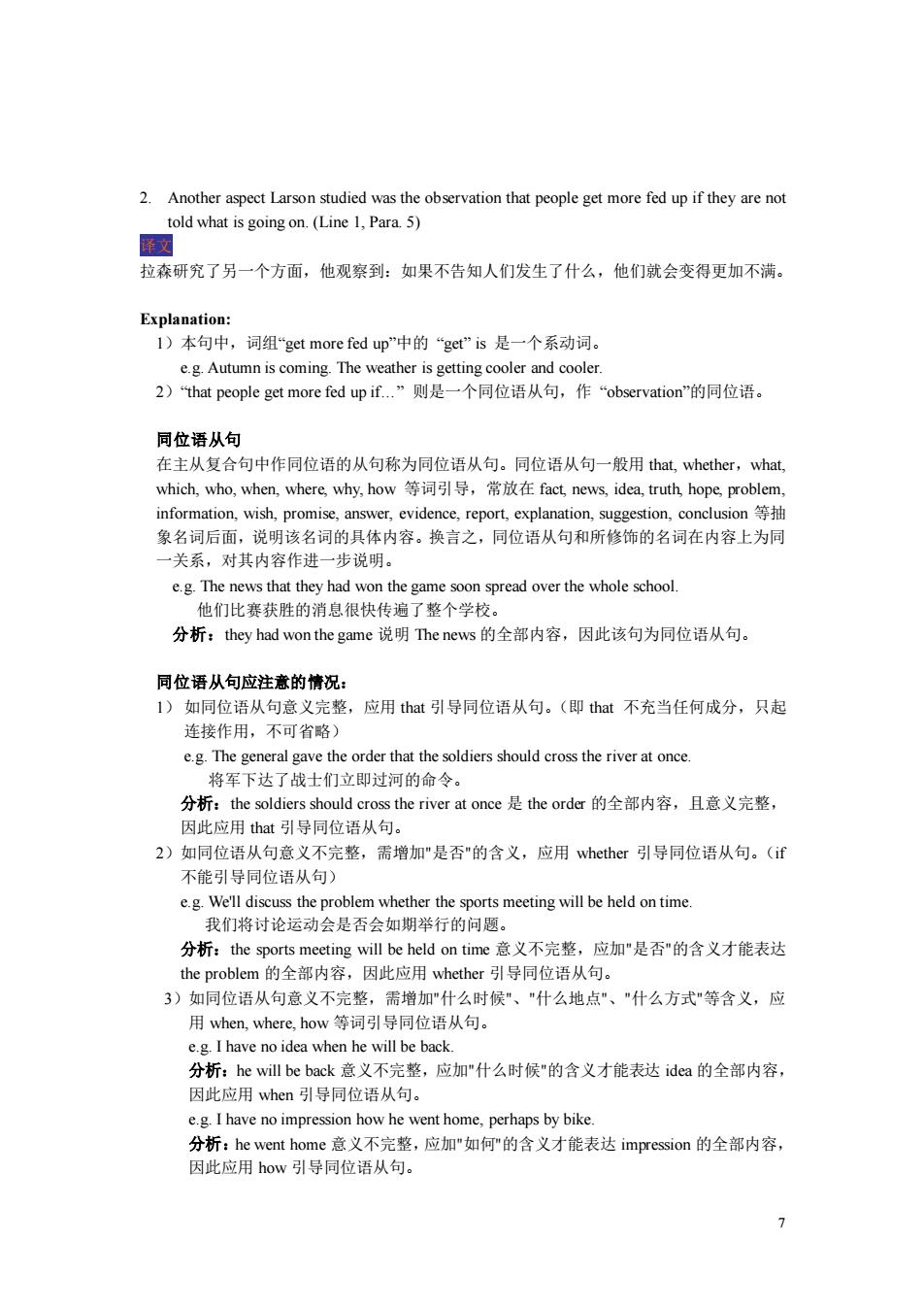
2.Another aspect Larson studied was the observation that people get more fed up if they are not told what is going on.(Line 1,Para.5) 译文 拉森研究了另一个方面,他观察到:如果不告知人们发生了什么,他们就会变得更加不满。 Explanation: I)本句中,词组“get more fed up”中的“get”is是一个系动词。 e.g.Autumn is coming.The weather is getting cooler and cooler. 2)“that people get more fed up if.”则是一个同位语从句,作“observation”的同位语。 同位语从句 在主从复合句中作同位语的从句称为同位语从句。同位语从句一般用that,whether,what which,who,when,where,.why,how等词引导,常放在fact,news,.idea,truth,hope,problem, information,wish,promise,answer,evidence,report,explanation,suggestion,conclusion 象名词后面,说明该名词的具体内容。换言之,同位语从句和所修饰的名词在内容上为同 一关系,对其内容作进一步说明。 e.g.The news that they had won the game soon spread over the whole school. 他们比赛获胜的消息很快传遍了整个学校。 分析:they had won the game说明The news的全部内容,因此该句为同位语从句。 同位语从句应注意的情况: 1)如同位语从句意义完整,应用that引导同位语从句。(即that不充当任何成分,只起 连接作用,不可省略) e.g.The general gave the order that the soldiers should cross the river at once. 将军下达了战士们立即过河的命令。 分析:the soldiers should cross the river at once是the order的全部内容,且意义完整, 因此应用that引导同位语从句。 2)如同位语从句意义不完整,需增加"是否"的含义,应用whether引导同位语从句。(if 不能导同位语从句) e.g.We'll discuss the problem whether the sports meeting will be held on time. 我们将讨论运动会是否会如期举行的问题。 分析:the sports meeting will be held on time意义不完整,应加"是否"的含义才能表达 the problem的全部内容,因此应用whether引导同位语从句。 3)如同位语从句意义不完整,需增加"什么时候"、"什么地点"、"什么方式"等含义,应 用when,where,how等词引导同位语从句。 e.g.I have no idea when he will be back. 分析:he will be back意义不完整,应加"什么时候"的含义才能表达idea的全部内容, 因此应用when引导同位语从句。 e.g.I have no impression how he went home,perhaps by bike. 分析:he went home意义不完整,应加"如何"的含义才能表达impression的全部内容, 因此应用how引导同位语从句
7 2. Another aspect Larson studied was the observation that people get more fed up if they are not told what is going on. (Line 1, Para. 5) 译文 拉森研究了另一个方面,他观察到:如果不告知人们发生了什么,他们就会变得更加不满。 Explanation: 1)本句中,词组“get more fed up”中的 “get” is 是一个系动词。 e.g. Autumn is coming. The weather is getting cooler and cooler. 2)“that people get more fed up if…” 则是一个同位语从句,作 “observation”的同位语。 同位语从句 在主从复合句中作同位语的从句称为同位语从句。同位语从句一般用 that, whether,what, which, who, when, where, why, how 等词引导,常放在 fact, news, idea, truth, hope, problem, information, wish, promise, answer, evidence, report, explanation, suggestion, conclusion 等抽 象名词后面,说明该名词的具体内容。换言之,同位语从句和所修饰的名词在内容上为同 一关系,对其内容作进一步说明。 e.g. The news that they had won the game soon spread over the whole school. 他们比赛获胜的消息很快传遍了整个学校。 分析:they had won the game 说明 The news 的全部内容,因此该句为同位语从句。 同位语从句应注意的情况: 1) 如同位语从句意义完整,应用 that 引导同位语从句。(即 that 不充当任何成分,只起 连接作用,不可省略) e.g. The general gave the order that the soldiers should cross the river at once. 将军下达了战士们立即过河的命令。 分析:the soldiers should cross the river at once 是 the order 的全部内容,且意义完整, 因此应用 that 引导同位语从句。 2)如同位语从句意义不完整,需增加"是否"的含义,应用 whether 引导同位语从句。(if 不能引导同位语从句) e.g. We'll discuss the problem whether the sports meeting will be held on time. 我们将讨论运动会是否会如期举行的问题。 分析:the sports meeting will be held on time 意义不完整,应加"是否"的含义才能表达 the problem 的全部内容,因此应用 whether 引导同位语从句。 3)如同位语从句意义不完整,需增加"什么时候"、"什么地点"、"什么方式"等含义,应 用 when, where, how 等词引导同位语从句。 e.g. I have no idea when he will be back. 分析:he will be back 意义不完整,应加"什么时候"的含义才能表达 idea 的全部内容, 因此应用 when 引导同位语从句。 e.g. I have no impression how he went home, perhaps by bike. 分析:he went home 意义不完整,应加"如何"的含义才能表达 impression 的全部内容, 因此应用 how 引导同位语从句
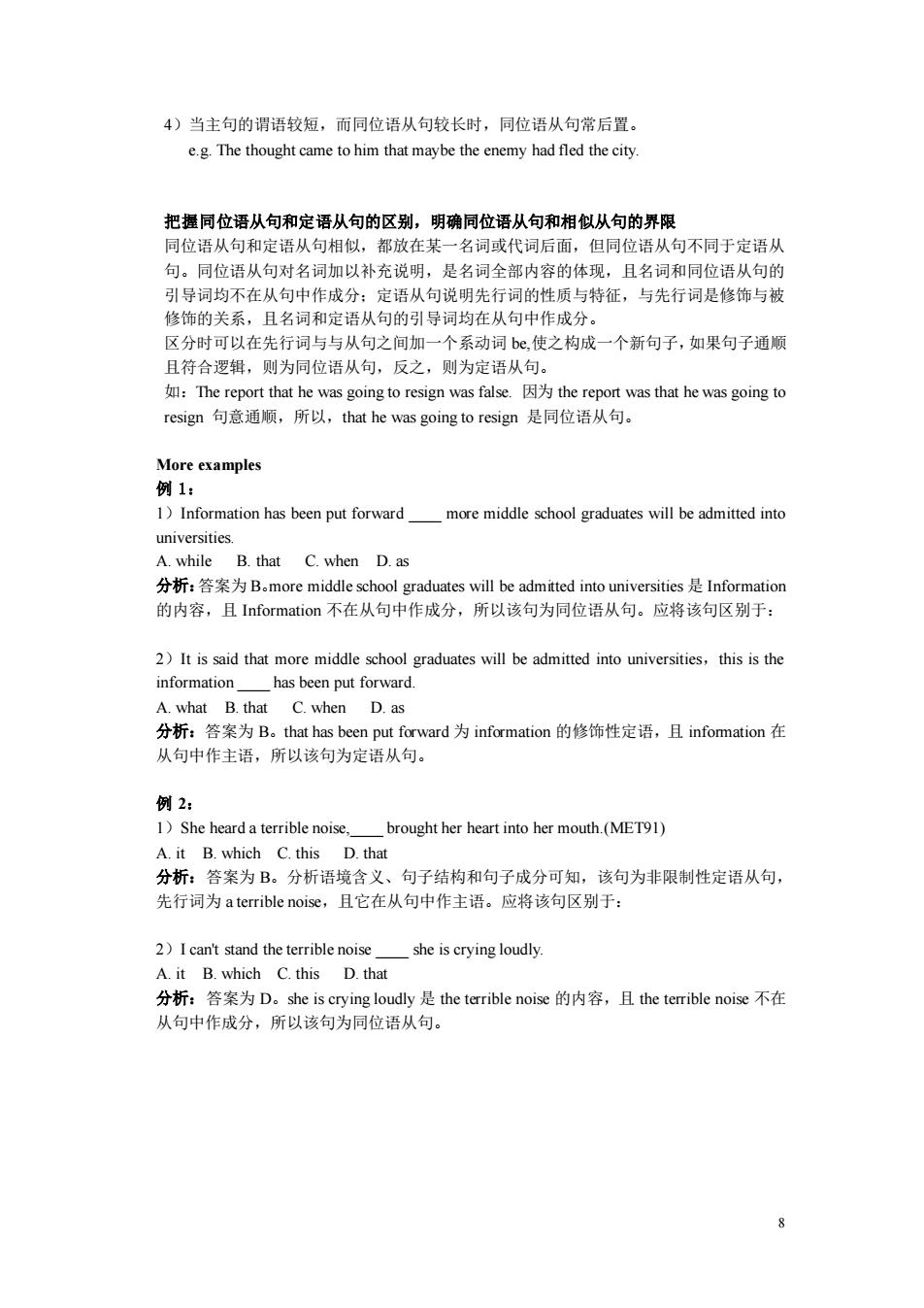
4)当主句的谓语较短,而同位语从句较长时,同位语从句常后置。 e.g.The thought came to him that maybe the enemy had fled the city. 把握同位语从句和定语从句的区别,明确同位语从句和相似从句的界限 同位语从句和定语从句相似,都放在某一名词或代词后面,但同位语从句不同于定语从 句。同位语从句对名词加以补充说明,是名词全部内容的体现,且名词和同位语从句的 引导词均不在从句中作成分:定语从句说明先行词的性质与特征,与先行词是修饰与被 修饰的关系,且名词和定语从句的引导词均在从句中作成分。 区分时可以在先行词与与从句之间加一个系动词b.使之构成一个新句子,如果句子通顺 且符合逻辑,则为同位语从句,反之,则为定语从句。 如:The report that he was going to resign was false.因为the report was that he was going to resign句意通顺,所以,that he was going to resign是同位语从句。 More examples 例1: 1)Information has been put forward more middle school graduates will be admitted into universities. A.while B.that C.when D.as 分析:答案为B。more middle school graduates will be admitted into universities是Information 的内容,且Information不在从句中作成分,所以该句为同位语从句。应将该句区别于: 2)It is said that more middle school graduates will be admitted into universities,this is the information has been put forward. A.what B.that C.when D.as 分析:答案为B。that has been put forward为information的修饰性定语,且information在 从句中作主语,所以该句为定语从句。 例2: 1)She heard a terrible noise,brought her heart into her mouth.(MET91) A.it B.which C.this D.that 分析:答案为B。分析语境含义、句子结构和句子成分可知,该句为非限制性定语从句, 先行词为a terrible noise,且它在从句中作主语。应将该句区别于: 2)I can't stand the terrible noise she is crying loudly. A.it B.which C.this D.that 分析:答案为D。she is crying loudly是the terrible noise的内容,且the terrible noise不在 从句中作成分,所以该句为同位语从句。 8
8 4)当主句的谓语较短,而同位语从句较长时,同位语从句常后置。 e.g. The thought came to him that maybe the enemy had fled the city. 把握同位语从句和定语从句的区别,明确同位语从句和相似从句的界限 同位语从句和定语从句相似,都放在某一名词或代词后面,但同位语从句不同于定语从 句。同位语从句对名词加以补充说明,是名词全部内容的体现,且名词和同位语从句的 引导词均不在从句中作成分;定语从句说明先行词的性质与特征,与先行词是修饰与被 修饰的关系,且名词和定语从句的引导词均在从句中作成分。 区分时可以在先行词与与从句之间加一个系动词 be,使之构成一个新句子,如果句子通顺 且符合逻辑,则为同位语从句,反之,则为定语从句。 如:The report that he was going to resign was false. 因为 the report was that he was going to resign 句意通顺,所以,that he was going to resign 是同位语从句。 More examples 例 1: 1)Information has been put forward ____ more middle school graduates will be admitted into universities. A. while B. that C. when D. as 分析:答案为 B。more middle school graduates will be admitted into universities 是 Information 的内容,且 Information 不在从句中作成分,所以该句为同位语从句。应将该句区别于: 2)It is said that more middle school graduates will be admitted into universities,this is the information ____ has been put forward. A. what B. that C. when D. as 分析:答案为 B。that has been put forward 为 information 的修饰性定语,且 information 在 从句中作主语,所以该句为定语从句。 例 2: 1)She heard a terrible noise,____ brought her heart into her mouth.(MET91) A. it B. which C. this D. that 分析:答案为 B。分析语境含义、句子结构和句子成分可知,该句为非限制性定语从句, 先行词为 a terrible noise,且它在从句中作主语。应将该句区别于: 2)I can't stand the terrible noise ____ she is crying loudly. A. it B. which C. this D. that 分析:答案为 D。she is crying loudly 是 the terrible noise 的内容,且 the terrible noise 不在 从句中作成分,所以该句为同位语从句